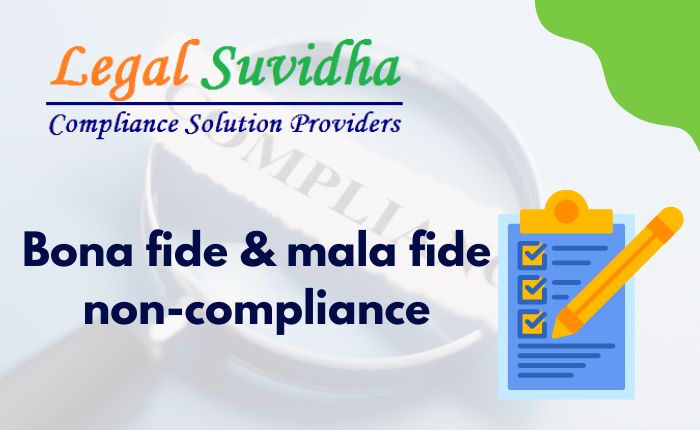Bona fide & mala fide non-compliance
Bona fide non-compliance refers to non-compliance that occurs unintentionally or without any malicious intent. This may happen due to a mistake, ignorance of the law, or a genuine inability to comply with the rules.
On the other hand, mala fide non-compliance refers to intentional or deliberate non-compliance, where a person or entity knowingly fails to comply with the rules or regulations.
Difference between Bona fide and Mala fide non-compliance –
| Bona fide Non-Compliance | Mala fide Non-Compliance | |
|---|---|---|
| Intent | Unintentional or without malicious intent | Intentional or with malicious intent |
| Level of fault | Non-wilful act and considered less serious | Deliberate act and considered more serious |
| Consequences | Warning, explanation, or request for remedial action | Legal action, fines, penalties, or criminal charges |
| Examples | Misunderstanding of the law, inadvertent error | Deliberate evasion, fraud, intentional violation of the law |
In summary, Bona fide non-compliance is unintentional or without malicious intent, considered less serious, and may result in a warning, explanation, or request for remedial action. Mala fide non-compliance is intentional or with malicious intent, considered more serious, and may result in legal action, fines, penalties, or criminal charges.
The action taken by the Proper Officer in case of Bona fide non-compliance and Mala fide non-compliance may differ based on the nature of non-compliance.
In case of Bona fide non-compliance, the Proper Officer may take a lenient approach towards the non-compliant party.
- The officer may try to educate and assist the party in rectifying the situation.
- The officer may also provide guidance on the compliance requirements and help the party to avoid future non-compliance.
- Depending on the severity of the non-compliance, the officer may issue a warning or request the party to take remedial action.
In case of Mala fide non-compliance, the Proper Officer may take a more serious approach towards the non-compliant party.
- The officer may initiate legal action against the party, which may include imposing fines or penalties.
- The officer may also consider prosecuting the party for criminal offenses if the non-compliance is severe enough.
- The officer may also take steps to prevent the party from continuing the non-compliance in the future.
In summary, the action taken by the Proper Officer in case of Bona fide non-compliance and Mala fide non-compliance may differ significantly, depending on the nature of non-compliance. While the officer may take a lenient approach in case of Bona fide non-compliance, they may take a more serious approach in case of Mala fide non-compliance to ensure compliance with the rules and regulations.
Examples of Bona fide and Mala fide non-compliance –
Bona fide non-compliance:
- An organization inadvertently fails to comply with a minor regulatory requirement due to a lack of understanding of the law.
- A taxpayer unintentionally fails to file their tax returns on time due to an unforeseen circumstance such as a natural disaster or medical emergency.
- A company fails to include a required disclosure in its financial statements due to an unintentional oversight.
Mala fide non-compliance:
- An organization knowingly provides false information in its regulatory filings to evade compliance requirements.
- A taxpayer deliberately understates their income on their tax returns to avoid paying higher taxes.
- A company intentionally misrepresents its financial statements to attract investors or secure loans.
- A person intentionally violates safety regulations to save costs and increase profits.
In summary, Bona fide non-compliance is an unintentional or inadvertent act, while Mala fide non-compliance is an intentional and deliberate violation of rules and regulations.
If You have any query then connect with us at [email protected] or you can contact us & stay updated with our latest blogs & articles.









